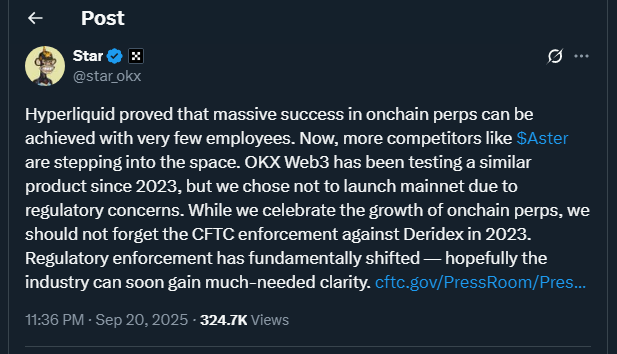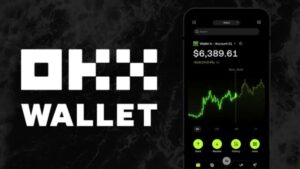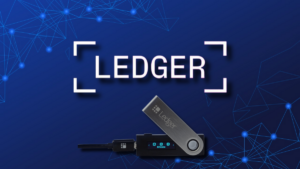TL;DR
- OKX had quietly developed a perpetuals-focused decentralized exchange similar to Hyperliquid but decided not to launch it on mainnet, citing unresolved regulatory risks.
- CEO Star Xu pointed to the CFTC’s 2023 crackdown on Deridex and other projects as a decisive factor.
- Despite the pause, interest in onchain perpetuals is soaring globally, while U.S. lawmakers debate new frameworks that could reshape the industry’s future.
OKX, one of the largest global crypto exchanges, revealed that its Web3 division has been testing a perpetuals-driven decentralized exchange since 2023. The platform was designed to compete with leading onchain derivatives players, yet the company chose to delay its release, concerned about the shifting regulatory landscape in the United States and the potential consequences of premature deployment.
Rising Momentum In Onchain Perpetuals
According to founder and CEO Star Xu, the decision to hold back was strongly influenced by the U.S. Commodity Futures Trading Commission’s enforcement action in 2023 against Deridex, Opyn, and ZeroEx. These projects were charged for offering leveraged derivatives without proper registration. Xu emphasized that regulatory enforcement has now taken on a new dimension, forcing exchanges to reconsider launch strategies and prioritize compliance before innovation.
Meanwhile, competitors are experiencing remarkable growth. Hyperliquid, launched in 2024, has already processed hundreds of billions in monthly trading volume, making it one of the most active protocols in decentralized finance. Similarly, ASTER, backed by YZi Labs, has crossed the $20 billion mark in recent 30-day volumes, confirming strong demand for decentralized derivatives platforms despite ongoing oversight challenges.
The hesitation from OKX shows the delicate balance major players must strike: driving innovation while mitigating potential regulatory fallout. Still, Xu remains optimistic that clearer frameworks will soon emerge, enabling the safe launch of new products and strengthening trust between institutional players and decentralized ecosystems.
Shifting U.S. Regulatory Dynamics
Recent developments suggest that progress is being made toward regulatory clarity. The CFTC has expanded its Digital Asset Markets Subcommittee, incorporating leaders from Uniswap Labs, Aptos Labs, Chainlink, and major financial institutions such as BNY. JPMorgan’s Scott Lucas and Franklin Templeton’s Sandy Kaul were also named as co-chairs.

At the same time, the 2025 draft of the Responsible Financial Innovation Act introduces explicit protections for DeFi builders, validators, and wallet developers, as long as the protocols remain sufficiently decentralized and free from centralized operational control. A public roundtable is scheduled later this month to refine these proposals with active industry participation.
For now, OKX remains cautious, but the evolving U.S. regulatory landscape may eventually provide the clarity needed for the exchange to activate its long-prepared Hyperliquid-style decentralized platform.











